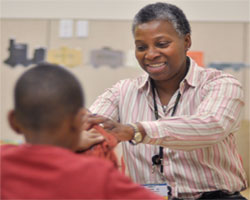Debbie Carter Teaches Therapeutic Teamwork
Faculty Profile
By Steve Lipsher
 When Dr. Debbie Carter’s psychiatry residents try to help a child, they don’t work alone. They partner with families, social workers, school officials and probation officers in a novel—and illuminating—treatment for troubled youth.
When Dr. Debbie Carter’s psychiatry residents try to help a child, they don’t work alone. They partner with families, social workers, school officials and probation officers in a novel—and illuminating—treatment for troubled youth.
Carter, an associate professor in psychiatry for the University of Colorado School of Medicine, says multisystemic therapy, or MST, is a teamwork approach that allows newly minted doctors to apply their training alongside other professionals, increasing their confidence and ensuring that their patients are moving in the right direction.
“We didn’t create multisystemic therapy,” Carter says. “But we are using that … therapy both as an academic teaching tool and for our research residents—to really help them get a good sense of what an end product might be.”
Making actual house calls, therapists “have an opportunity to bring mental-health treatment right where the youth and family are,” typically gleaning valuable insight in experiencing the patients’ world, she says.
Individualized therapy
The social and financial strains facing teens and their families, for example, become evident—perhaps manifested in drug use or truancy—and that information helps the team develop treatments. Therapists and juvenile justice officials work hand-in-hand with schools and social workers to help
The group approach helps ensure that the patients get what they need from a wide range of professionals, whether it’s developing an individualized education plan at school or teaching tactics their parents can use to discourage drug use. And it comes with an added benefit: reinforcing the education of young doctors.
“I’ve had some residents say that it’s really interesting to have that co-therapy relationship because they really feel like there’s a lot of support around their part of the treatment program,” Carter says. “I think it’s more enjoyable because it really gives the residents a road map.”
Mike Rollin, MD, a child-psychiatry fellow in his fourth year of residency, credits Carter and the MST program with easing the transition from student to physician and erasing his initial doubts.
“They always say the hardest day of your professional career is your first day out of residency,” he says, noting that Carter taught him to use “so many tools in your
A "phenomenal clinician"
Carter, who has been Rollin’s professional mentor for the past four years and now serves as his training director, has an uncanny ability to see the big picture as a therapist, an instructor
“She’s the one person … who has the best handle on utilizing all your tools and all the ways to think about things,” Rollin
A
During a stint as an Indian Health Service psychiatrist on a Navajo reservation, Carter honed her passion for community psychiatry and cross-cultural care. In addition to teaching and her work as medical director for the MST program, the seemingly tireless Carter serves in numerous other roles: She is the medical director of the Kempe Therapeutic School for abused and neglected young children, she maintains a clinical practice focusing on addictive women and she is one of three training directors for a program that grooms future faculty members interested in academic research in juvenile and adolescent psychiatry.
In the latter program, third-year residents serve on the MST team as therapist or physician, through which they can “translate research therapy into real practice,” Carter says, once again embracing a holistic approach in which the sum exceeds the parts.
“I love being in child psychiatry, and the clinical activities capture all of my passions for working with at-risk populations,” she says. “It gives you a chance to use your brain to help another brain. I think it’s fascinating that you can change another human being just by talking.”